Passing It On: Mentoring the Next Generation of Lifters
There’s a point in every coach’s journey where you stop thinking only about your own success and start looking at the people coming up behind you.
For me, that moment started with noticing a gap: the space between being a great lifter and becoming a great coach. They’re not the same. Knowing how to move a barbell doesn’t automatically translate into knowing how to guide someone else to do the same—especially under pressure, on a platform, or across months of ups and downs. That gap is where mentorship comes in. And that’s why I started building into the next generation of coaches.
My goal? Grow the sport. Give back to what’s given me so much. And help passionate people become more confident, capable coaches.
What New Coaches Actually Need
Most newer coaches don’t struggle with passion—they struggle with direction. They want to be helpful, but they’re not always sure what to look for or how to lead.
That’s where mentorship plays a huge role. It gives coaches:
A system to identify movement errors
Clarity on how to support athletes based on their goals—not the coach’s goals
The confidence to run a warm-up room or count attempts under pressure
A resource to lean on when situations get messy (and they will)
It’s not about giving them all the answers—it’s about showing them how to ask better questions and make decisions under pressure.
It Starts With People
One of the most important things I teach: Know your athletes. Understand their values. Align with their goals. Your programming only matters if it supports them, not the other way around.
A good mentor doesn’t just say “here’s how to fix your jerk.” They ask:
Why are you here?
What do you care about?
How do you define success?
And then they build trust through time, consistency, and being present for the highs and the lows.
Watching the Lightbulb Click
A standout moment for me was with Coach Joe. I threw him into the fire at a meet—gave him an athlete and said, “Go count for them.” We’d trained for it, he’d studied and shadowed, but this was his moment to own it.
He started hesitant, checking in for reassurance. But halfway through, something clicked. He stopped asking. He just did. He took full control, adapted as things changed, and most importantly, kept the athlete calm and ready. I saw the shift from someone who was learning to someone who was a coach.
Those are the moments that stick.
What I Hope They Carry Forward
Years from now, I hope every coach I’ve mentored walks into a meet, a gym, or a hard conversation and thinks:
“I’ve done this before. I’m ready. I can handle it.”
I hope they look back and remember the chaotic backrooms, the PR celebrations, the hard debriefs—and realize how much they’ve grown.
And most of all, I hope they understand the impact they’re making now on the lifters they coach.
That’s what makes it all worth it.
💬 Want to Be Mentored?
Whether you’re a newer coach or an experienced athlete stepping into a coaching role, we’re building mentorship opportunities inside TriState Training. Reach out through the site or on Instagram (@TriState_Barbell) if you’re ready to grow your skills and your impact.

